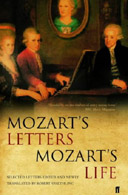
Mozart's Letters, Mozart's Life: Selected Letters, edited and translated by Robert Spaethling (Faber, £9.99)
It is very easy to go through life without thinking about Mozart. You can just let the music wash over you. After all, as Charles Rosen said, "Mozart's music is clearly intelligible without the slightest knowledge of his life," and when some people do start thinking about the man as opposed to the music, they end up - pace Peter Shaffer - spouting the most cranky and untenable theories about Salieri, the masons, that mysterious commission for a requiem.
There is also the matter of his genius. Goethe once said - modestly not including himself in the list - that certain individuals, like Shakespeare and Mozart, were put on earth solely in order to provide frustratingly unattainable benchmarks of human capacity and achievement. Bearing this in mind, it is actually quite a relief that we know next to nothing about Shakespeare's life; and it is quite easy to choose to learn next to nothing about Mozart's. After all, he wasn't around that long, he spent most of the time composing, and no human detail can compare with the sublimity of the work.
So this is a very pleasantly surprising book, if you are as dimly aware of the details as I was before I picked it up. For Mozart, who spent a great deal of time away from home, wrote an enormous number of letters - and they're brilliant. There's a German edition, published between 1962 and 1975, comprising seven volumes; and earlier in the century, Emily Anderson produced an influential translation into English. The problem was that she ironed out Mozart's wildly idiosyncratic epistolary playfulness, turning him into a much more staid, Augustan personality than he really was.
Robert Spaethling's approach has been, above all, to preserve the tone of the originals. I cannot quite believe this hasn't been done before. Then again, I can. Here he is, 16 years old, in Bozen (now Bolzano), writing to his sister: "We are now already in Botzen [sic]. already? only! I'm hungry, I'm thirsty, I'm sleepy, I'm lazy, but I am well. At Hall we visited the convent; I played the organ there. Botzen is a shit hole. Here is a poem by someone who was totally fed up with Botzen, and angry: Before I come back to this Botzen place, / I'd rather smack myself in the face." Spaethling kindly explains that he has translated the word "fozen" as "face", but that it also means "female genitals". Spaethling says "face" is "definitely the meaning here", but I'm not so sure. The important thing, though, is that we are told about the alternative.
One thing I wasn't expecting, again because of my ignorance, was how Mozart wrote to his father. I'd been expecting a much starchier style, but he could be as inventive, and borderline scatalogical, as with his sister. Well, maybe not quite as scatalogical. To his mother, though, he can close off with: "For I'll have the Honour of kissing your hands / Though before I see you, I'll shit in my pants." I suppose if you're a genius you can get away with this kind of thing.
It's not all like this, of course. He grew up, and came to know death. There is much about rehearsals, interpretations, recommendations or condemnations of performers. (I am particularly intrigued by the mentions of glass harpsichords.) These subjects are discussed entirely unpretentiously, with a spontaneity and charm that speaks very well to us indeed. You get the impression of an extremely likeable man, incapable of dullness (and not Shaffer's tiresome buffoon).
There are also, notoriously, the money worries. Given his renown at the time, his death in poverty remains a perplexing scandal to this day. But even then you wonder how much the received wisdom can be trusted. One trick that Spaethling misses is the suggestion that Mozart's famous begging letters to Michael Puchberg - "Adieu! - Forgive me, for God's sake, do forgive me!" - are in fact calculated arias, as it were, conventional representations of misery that may as well be sung as spoken. Still, the letters are here - somehow, Spaethling has managed to cram two-thirds of them into this quite manageable and really quite wonderful volume.

